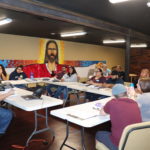(or How To Be a Better Pastor)
- Too many words confuse sheep. The shepherd learns the language that his sheep will recognize, then he uses that language to guide them around. The sheep learn the language and voice of the pastor, and they hear his voice when he calls to them. Harsh language disturbs sheep, while words of encouragement move them in the direction desired. ““I know my sheep and my sheep know me” (John 10:14)
- Shepherds lead the sheep. If the shepherd tried to send the sheep in the direction he desires, they would just go off track. The sheepdogs do not know the direction either, but they know how to get direction from the shepherd. If the shepherd is leading, the sheepdogs know how to move the sheep in the direction the shepherd is going. The sheep will go in any direction the sheepdogs steer them. Psalm 78:52 says, “[The Lord] made his own people to go forth like sheep, and guided them in the wilderness like a flock.”
- You cannot make sheep do something contrary to their nature. Trying to get a sheep to behave like a sheepdog is doomed to failure. Sheep know only how to be sheep. The shepherd must adapt to being a shepherd of sheep, not sheepdogs. You lead sheep, but give instructions to the sheepdogs. If you want your sheep to do something, get them to do things sheep do. If you want the sheep to go somewhere, lead them and get the sheepdogs to help you get them there. “He which hath begun a good work in you will perform it” (Philippians 1:6).
- Sheep are sheep, not “sheepish.” You cannot berate a sheep into doing something. The shepherd and yell at his sheep all he wants, but that will not gain him any advantage at all. Sheep want to be led. If sheep feel they are being attacked or in danger, they will run away. The thing that most makes sheep feel drawn to their shepherd is that they feel safe with him, because he takes care of them.
- The most manifest instinct of sheep is to flock. Except for just a few breeds such as those that live on the highest mountain tops, sheep like to be together. Most animals, if left free to roam, will scatter. But if sheep are left to themselves, they’ll stay together. They’re gregarious. This is helpful because they lack many of the natural defenses other animals have, such as speed or the personal protection a porcupine has. The protection of the flock comes from staying close together. To flock means to be in company together, to be a group. A good shepherd recognizes this and takes advantage of this quality. If the sheep feel safe and happy, they will grow and give wool, meat, etc.
- Do not confuse sheepdogs with the sheep. Trying to get sheep to do sheepdogs activities will not work, and likewise sheepdogs will not act like sheep. The good shepherd recognizes the role of each, and uses those roles to give each a purpose. Sheepdogs need to help the shepherd to move the sheep in the direction he wants them to go. Sheep need sheepdogs to use as guides to recognize the direction the shepherd wants to them to go. Shepherds need sheepdogs to help him in moving the sheep in the desired direction.
- The propensity of sheep is to follow other sheep. Sheep don’t really pay attention. If they are walking along following the sheep ahead of them, they will keep following as long as they are moving. When one sheep goes astray, it can inadvertently lead others away with itself as well. In cases where the shepherd has no sheepdogs, the shepherd can end up losing sheep, because of two problems: 1) Because he cannot just leave the flock alone, he may have to forget the one who got lost. 2) Because he cannot always keep an eye on each and every sheep every single moment, if he has no sheepdogs he will lose some of them.
- Sheep are instinctively fearful. Sheep are afraid of the unknown, of darkness, and of strange pastures and buildings. That keeps them appreciative of the shepherd and his helpers. It keeps them together for their mutual support and comfort. Trying to push a sheep into doing something they are unfamiliar with will spook them, and could cause them to run away. Also, the shepherd must be aware of the difference between sheep who run away, and those who get lost. The one who got lost did so out of lack of attention. If one runs away, that means the shepherd has a problem on his hands (threat, wolves, fearful activities, etc.).
- Sheep are among the dumbest of all creatures. Most animals, in many cases, will survive if released into the wild. They will learn to fend for themselves and make it. But a sheep released into the wild cannot survive. Sheep have no survival skills whatsoever. They are totally dependent upon the shepherd. The shepherd who forgets this is doomed to lose his sheep. Ordering sheep around does not work. Expecting sheep to know what to do will not work. Hoping sheep will get it and start behaving correctly will not work. If the shepherd is not leading, the sheep are going nowhere.
- Sheep are demanding. Ever watch a lamb suckle its mother? Almost as soon as it is born, it is violently sucking its mother’s udders. And that insatiable demand never leaves them. They demand grass, grass, and more grass; day after day, and night after night. (Do they ever sleep?) And when snow is on the ground, they aggressively demand food from the shepherd. Just listen to them bleat if their troughs are empty even for a short time. And watch the life-or-death stampede when the shepherd appears. The grumbling of the sheep is a signal to the shepherd that the sheep need something. His job is to identify the need and work on it.
- Sheep are restless. It always puzzled me how little sheep slept. I would be in my study at midnight, look out, and there they were still eating grass. And no matter what time I arose in the morning – 3am or 5am – they would still be eating grass. Other times, there would be a beautiful summer evening when everything was still and quiet and you would come across a field full of sprinting sheep (usually due to the Scottish midges – look it up on Google). I once heard that for sheep to lie down they need freedom from fear, freedom from friction with others, freedom from hunger, and freedom from pests and parasites. From what I’ve seen, that combination is very rare.







thank you for this mazing teaching. stay blessed